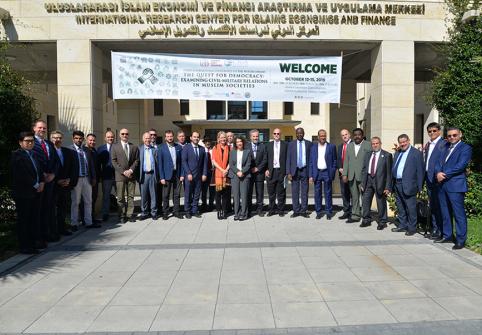News
College of Islamic Studies Participates at 3rd International Conference on the Muslim Ummah
21 Oct 2019Three day event strengthens HBKU’s ties with likeminded organizations in Turkey

In line with its efforts to inform intellectual debates on Islam at home and abroad, members of the College of Islamic Studies (CIS) recently participated in the Third International Conference on the Muslim Ummah.
Held in Istanbul between October 14 and 15, The Quest for Democracy: Examining Civil-Military Relations in Muslim Societies brought together leading academics to analyze the role of the military in different Muslim societies. This was illuminated through a series of case studies which examined the armed forces’ impact on a state’s economy and political system. Consideration was also given to the influence of regional and great powers alongside the state of civil-military relations in other parts of the world.
The Quest for Democracy was organized by Istanbul Sabahttin Zaim University (IZU) and its affiliate the Center for Islam and Global Affairs (CIGA). Alongside HBKU, the conference attracted the Al Jazeera Centre for Studies, University of Denver, and Egyptian Institute for Studies as academic partners and co-sponsors. For its part, CIS’ Dr. Louay Safi co-delivered the event’s opening remarks and participated in ‘Civil-Military Relations: The Way Forward’. The session provided the ideal opportunity for Dr. Louay to present his research project, entitled ‘The Military, Politics, and Democracy: Drawing Red Lines’.
In his presentation, Dr. Safi argued that the states that emerged from the struggle for independence in many Muslim countries were not national states but postcolonial states, whose governance shared many of the elements of colonial rule. Postcolonial states are ruled by civil-military elites who have acquired many of the attitudes and styles of former colonial masters, particularly their disdain for the larger population and their paternalistic and unaccommodating approach to dealing with popular demands. Changing the political dynamics in these societies requires deep changes in cultural outlook and social behavior, including a new-founded civic awareness and moral commitment to improving the public space and the scope of citizen participation.
Speaking after the event, Dr. Louay said: “It was a privilege to offer my perspectives and represent CIS and HBKU at the 3rd International Conference on the Muslim Ummah. We’re determined to build partnerships with likeminded academic institutes around the world, and Turkey is no exception. Often controversial and consistently misunderstood issues, such as civil-military relations, are an important feature of the global political and security landscape. The organizers of this conference are to be commended for their determination to unpack the issues surrounding this often-emotive topic.”
The College of Islamic Studies regularly hosts public lectures and conferences to promote a deeper understanding of the various aspects of Islam among the wider community. In 2017, HBKU committed to furthering mutual academic objectives when an agreement was signed with IZU. The four-year partnership presented several opportunities for graduate-level cooperation and vital scholarly exchanges.
For more information, please visit cis.hbku.edu.qa
